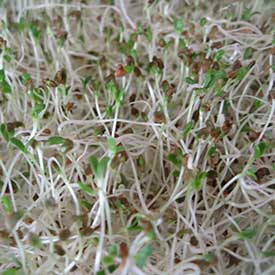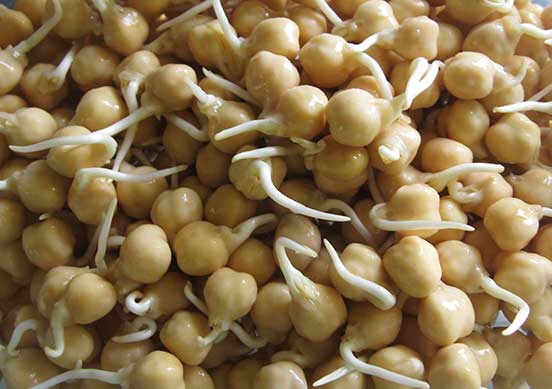
Sprouting is an easy and economical way to add vitamins, minerals and digestive enzymes to your diet. Sprouting increases vitamin content by up to 700% and provides a rich source of antioxidant and anti-carcinogenic proteins, minerals and vitamins. Alfalfa sprouts are high in vitamins A, B, C, E and K, and amino acids; they help lower cholesterol and fat, and stimulate immunity.
How to sprout
You will need a wide jar and a piece of muslin or wire mesh to cover the mouth of the jar and a rubber band to hold it in place. Or you can buy a sprouting jar or use a bowl and colander to soak and drain your seeds, grains, beans or nuts.
As a general rule, add 2-3 parts water to 1 part seed, too much water is better than not enough, as the seeds will only soak up as much as they need. Different seeds have different soaking times, so while you can’t use too much water, you can soak for too long. Stir your seeds up to separate them. You can add a pinch of unrefined sea salt to re-mineralise the water and improve the taste.
Place the seeds away from direct sunlight and leave to soak. Most seeds can be soaked for 8-12 hours although smaller seeds such as alfalfa or clover will need less time. Check your seed packet for specific guidelines.
Pour off the water, (or use to feed your plants) and rinse your seeds well. Drain again and place in a darkened area. You want to keep your seeds well drained but moist with plenty of air circulating, so as to deter fungal growth. Rinse the sprouts 3 -4 times a day to keep them from drying out. Regular rinsing also improves the taste of the sprouts.
When your sprouts are ready, they will have grown tails by now, usually about a quarter inch, if you are sprouting beans. Or if you are sprouting small vegetable seeds, move into the light to encourage more green growth. Harvest when ready and store in the refrigerator for up to a week.
Sprouts can account for up to 20% of your daily food intake. They are versatile and delicious added to salads or eaten as a convenient snack. Sprouted chickpeas, lentils, barley, mung beans and other pulses can be blended with olive oil, lemon juice and herbs to make tasty vegetarian patés or dips. You can also add to a stir-fry at the last minute so they are just gently warmed rather than cooked.

Sprouted chickpeas make a nutritious addition to salads or use them
to make delicious raw hummus. They are a good source of carbohydrates, dietary fibre, protein, Vitamins A and C, calcium, iron and magnesium.
